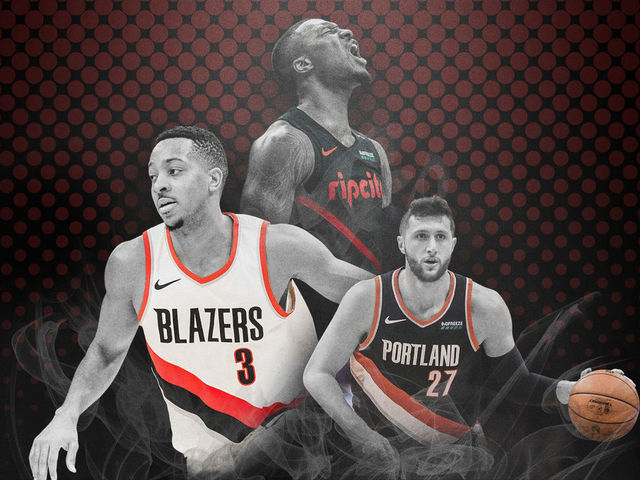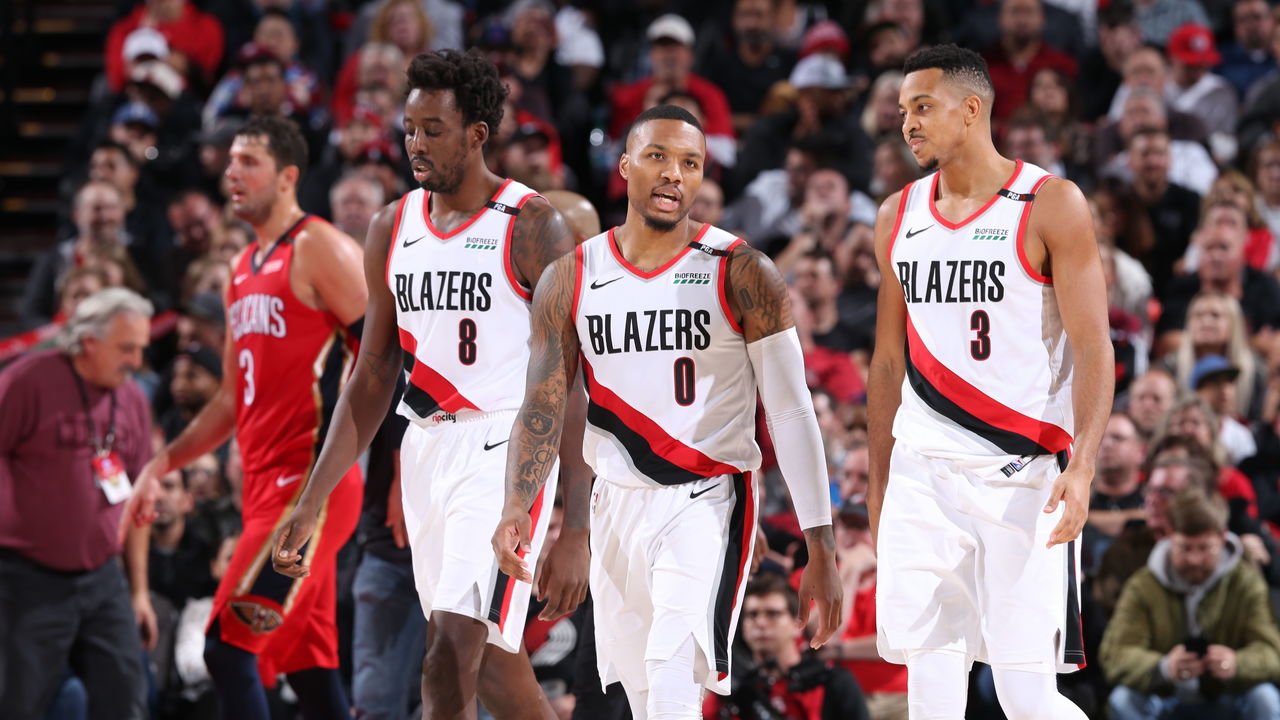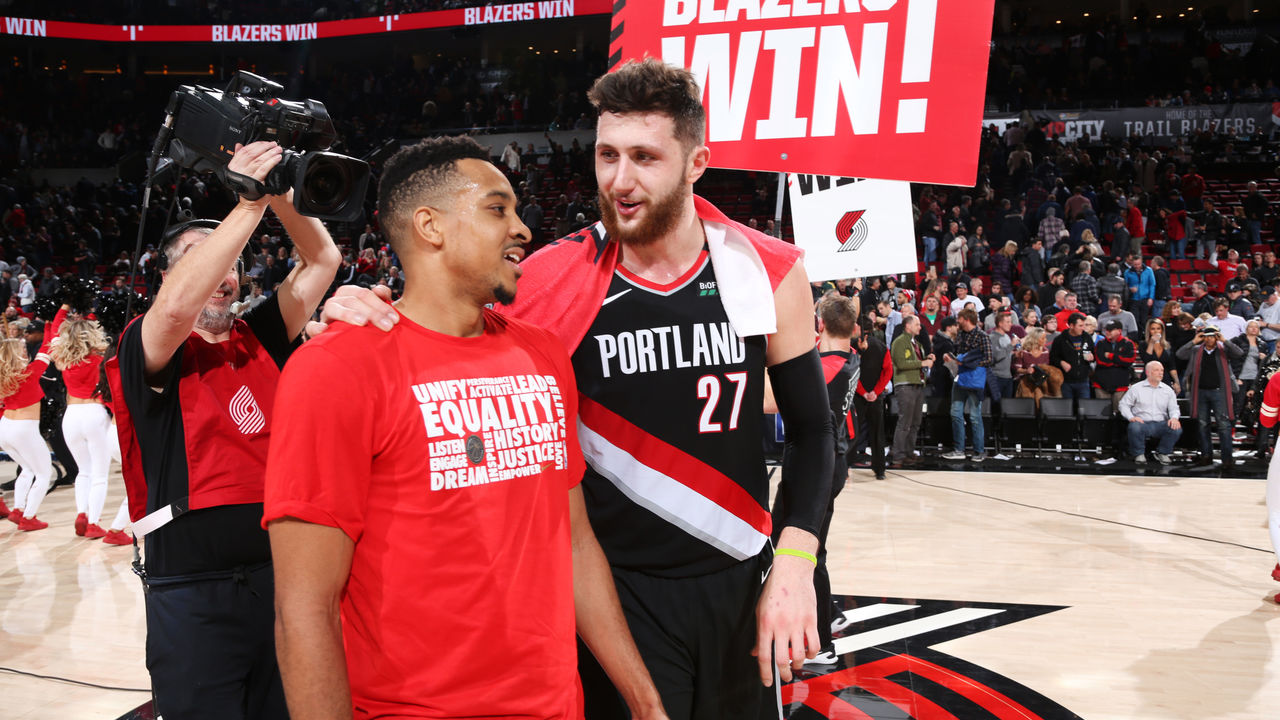The Blazers are the same, but trying to be different

The Portland Trail Blazers just submitted one of their most impressive performances of the season, improving to 34-23 after running away from the defending champion Golden State Warriors in their last game before the All-Star break.
If that sounds familiar, maybe it's because a year ago today, the Blazers produced one of their best showings of the 2017-18 season, beating the defending champion Warriors in their last game before the All-Star break to improve to 32-26. It seems like every year around this time, they go on a buzz-generating run, as that Warriors win was their first of 11 straight last season, and this season Portland is going into the break carrying the league's third-best net rating since December.
But springtime hasn't been kind to them, and the hype has understandably been tamped down this time around. The team has lost 10 straight playoff games dating back to 2016, and while the first six of those losses could be excused - coming against those same monolithic Warriors - the disastrous sweep at the hands of the New Orleans Pelicans last year leaves a sour taste.
The 2018-19 Blazers share a lot of DNA with last year's team, and with earlier iterations: The same head coach in Terry Stotts; the same three-man core of Damian Lillard, C.J. McCollum, and Jusuf Nurkic; and mainstays Al-Farouq Aminu, Mo Harkless, and Evan Turner headlining a crop of role players.
For a while now, sameness has defined the Blazers. They've straddled the line between thriving on familiarity and growing stale from too much of it. Comfort can breed success, but it can also breed stagnation.

This year's Blazers are trying to distinguish themselves. They've reoriented their offense, de-emphasizing the pick-and-roll in favor of more weave and motion sets. They've empowered their supporting cast, regularly trotting out full-bench lineups (one of which pulled away from the Warriors on Wednesday night). They've bumped their assist rate up more than five percent, and are throwing about 15 more passes per game. And they've become a more voracious cutting team.
Nurkic has been the biggest driver of those changes while rounding out his game, and he's quietly producing a terrific season. He's already posted a 5x5 game (which doubled as a 20-20 game), a separate game in which he finished with a triple-double and five blocks, and two other games with at least seven assists and six blocks. He's nearly doubled his assist rate from last season and ranks 15th in ESPN's Real Plus-Minus, and 16th in Basketball-Reference's Box Plus-Minus. With him on the floor, the Blazers are outscoring teams by nearly eight points per 100 possessions.
Portland is running more plays through Nurkic from the high post. The Blazers are asking him to initiate through dribble-handoffs - with Lillard and McCollum scooting around ready to stop and pop - and leveraging that threat to open up a bunch of back cuts, or Nurkic's own show-and-go drives.
He can lob passes over the top, or thread bounce passes through tight spaces. He can make plays from all three levels of the post. Nurkic can also maul on the low block and the offensive glass, and even go iso against slower centers.
But his passing is what stands out most because of how he activates the team's off-ball game.
The Blazers looked shellshocked when the Pelicans smothered their pick-and-roll game during last year's playoffs. They needed a little more variety and a little less predictability.
They also needed more players who can be trusted in big moments, and it's unclear if that's changed. But the Blazers are at least building that trust, whether it's through letting Nurkic explore the boundaries of his playmaking, handing the offensive second-unit keys to Turner, or letting promising young center Zach Collins play through some sophomore slumps.
The contributions from Blazers role players can be amplified in the postseason, and Aminu is a good example. When teams load up on McCollum and Lillard, he often finishes possessions, and his usage rate has jumped significantly from the regular season to the playoffs during his time with the Blazers. Last year, it spiked from 14.8 percent to 19.2 percent.
Jake Layman might help ease the pressure off Portland's primary guys in this year's playoffs. The third-year forward, who played just 160 minutes last year, has emerged out of nowhere to become an indispensable part of the Blazers' rotation, offering a release valve for Nurkic and the backcourt. Since the start of the new year, he's averaged 12.6 points on .571/.391/.818 shooting.
Layman has developed into a reliable spot-up shooter and one of the league's most intuitive and opportunistic cutters. He's particularly good at using misdirection, selling a screen for just long enough to throw defenders off the scent before darting to the rim.
This season, Layman is shooting an insane 67.5 percent on 2-pointers, and a respectable 37.4 percent on threes. He's helped the Blazers surge into the league's top five in offensive efficiency. He's also starting to feel himself and is becoming an ideal complementary piece.
All of this can feel a bit like window dressing. The Blazers might be better equipped to win a first-round series (or at least a first-round game), but their limitations probably haven't fundamentally changed. If previous seasons hadn't looked so similar on paper, the 2018-19 campaign would feel different. But "team on the rise" is an easier sell than "team making subtle tweaks and remaining good."
Big picture, the Blazers aren't even in a bad spot. They don't have to worry about their core aging out any time soon. Lillard is 28 years old, McCollum is 27, and Nurkic is 24, and all three have at least two years left on their contracts after this season. Lillard has also given zero indication that he's getting restless.
The team's situation shouldn't feel urgent, but it does.
It was disappointing when the trade deadline came and went without a major Blazers move. Portland has a well-balanced roster, with players who fit snugly into their roles, but that talent has an established ceiling. Without a bounty of assets to trade, or the promise of a high draft pick, the Blazers don't have much upward mobility, either.
For better or worse, the Blazers know their identity. In one of the season's wackiest stats, it took them until their 55th game to win a contest they trailed going into the fourth quarter, or lose one they led. That seems like a microcosm for the team as a whole because these Blazers don't have many surprises left.
That doesn't mean the season has been devoid of success stories.
Every year, Lillard gets a bit more patient in the pick-and-roll, a bit more precise with his skip passes, and a bit more focused as an off-ball defender. Aminu keeps doing his rock-solid 3-and-D thing, and as his shot has garnered more respect, he's been more vicious while attacking closeouts.
Elsewhere, Seth Curry is shooting the lights out after returning from major knee surgery, Collins is flashing loads of defensive potential and a nasty streak, and Layman and Nurkic have been joys to watch as the former emerges, and the latter takes a leap.

How the Blazers and their fans view this season will come down to their definition of success. Would winning a round in the Western Conference gauntlet be enough? How about simply being competitive in the first round?
Lillard, for his part, has always been pretty clear-eyed in his assessments of the team, and unwavering in what he values.
"I think you are almost better off taking your chances with 'Let's see if togetherness is going to beat the talent at some point,'" he told The Athletic's Jason Quick shortly before the deadline when asked about making upgrades.
"If we are ever going to sacrifice (chemistry), it would have to come with us being able to match a team with talent, and that's unlikely."
"I want to win a championship for this city," Lillard added, "but I'm not willing to put somebody under the bus to do it. "
The Blazers often acknowledge how far away they are from contending, which is rare among playoff teams. And if they ever forget, it seems like someone is always there to remind them.
A defining moment in this Blazers era came when Kevin Durant told McCollum to his face that the Blazers had no shot at a title. Another came when McCollum earnestly told a frustrated fan that he's trying his best to help his team overcome past failings.
Conventional NBA wisdom suggests that if a team isn't a championship contender now, it should try to be one in the future, regardless of the short-term cost. But that logic doesn't account for the zero-sum nature of the league. When every team is chasing the same goal, most will eventually need to adjust expectations. In that sense, the Blazers' realism is refreshing.
When faced with life's challenges, what can any of us really do aside from get a bit better every day, and attempt to find new ways to attack our problems - even the ones that we know, deep down, are not solvable? There is nobility in soldiering on, and in trying to change things about yourself while remaining, on a molecular level, the same.
If the Blazers are growing weary of that cyclical grind, they rarely show it. They still mostly play with bounce, joy, and even belief. They're capable of popping off at any time and dusting the defending champs, too, and shouldn't be dismissed so easily.